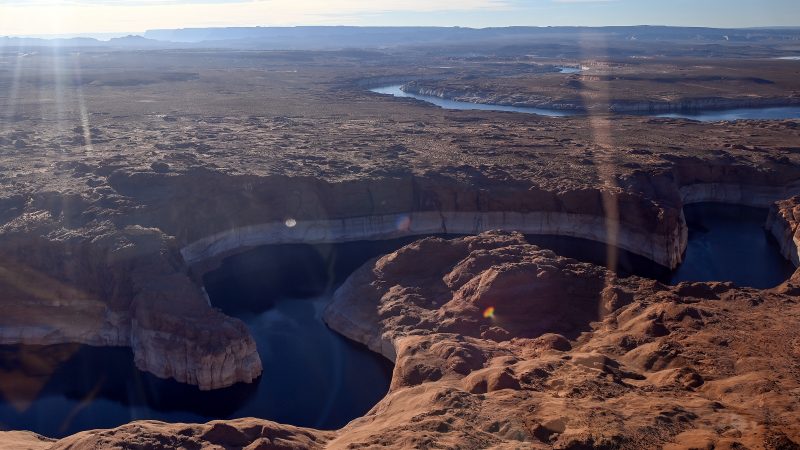The Supreme Court on Thursday rejected the Navajo Nation’s attempt to force the federal government to do more to secure water for its huge and arid reservation in the West.
In a 5-4 decision, Justice Brett M. Kavanaugh said an 1868 peace treaty between the United States and the Navajos does not require the federal government to take any “affirmative steps” to secure rights on behalf of the tribe to water from the Colorado River, which runs along part of the 17-million acre reservation that stretches through Arizona, New Mexico and Utah.
“[I]t is not the Judiciary’s role to rewrite and update this 155-year-old treaty,” Kavanaugh wrote. “Rather, Congress and the President may enact — and often have enacted — laws to assist the citizens of the western United States, including the Navajos, with their water needs.”
The decision drew a sharply worded dissent from Kavanaugh’s fellow conservative, Justice Neil M. Gorsuch, a former federal judge from Colorado who has emerged during his time on the high court as its most outspoken advocate for Indian tribes.
“Where do the Navajo go from here? To date, their efforts to find out what water rights the United States holds for them have produced an experience familiar to any American who has spent time at the Department of Motor Vehicles,” Gorsuch wrote. “The Navajo have waited patiently for someone, anyone, to help them, only to be told (repeatedly) that they have been standing in the wrong line and must try another.”
Supreme Court 2023 decisions
End of carousel
Navajo Nation President Buu Nygren said that the ruling was disappointing but that he was encouraged that four justices — Gorsuch and liberals Sonia Sotomayor, Elena Kagan and Ketanji Brown Jackson — were sympathetic.
“My job as the President of the Navajo Nation is to represent and protect the Navajo people, our land, and our future. The only way to do that is with secure, quantified water rights to the Lower Basin of the Colorado River,” Nygren said in a statement. “I am confident that we will be able to achieve a settlement promptly and ensure the health and safety of my people.”
The Navajo lawsuit sought to make the federal government “determine the water required to meet the needs” of the reservation and “devise a plan to meet those needs,” Kavanaugh wrote. The government resisted, and Arizona, Nevada, Colorado and some water districts in California intervened to protect their shares of water.
Water is scarce in the West, and the Colorado River Basin has been struck by a drought for years. Kavanaugh said such conditions required caution.
“Allocating water in the arid regions of the American West is often a zero-sum situation,” he wrote, and not one suitable for judicial decision-making. It is better for Congress and the president to “enact appropriations laws and to otherwise update federal law as they see fit in light of the competing contemporary needs for water.”
Kavanaugh said the treaty was very explicit about some things the United States must supply the Navajo — schools, a chapel, a blacksmith shop, plants and seeds, and livestock — “but the treaty said nothing about any affirmative duty for the United States to secure water.”
With his wife and a daughter listening in the courtroom, Kavanaugh read extensively from his opinion in announcing the decision. He was joined in the majority by Chief Justice John G. Roberts Jr. and Justices Clarence Thomas, Samuel A. Alito Jr. and Amy Coney Barrett.
Gorsuch gazed at the ceiling as Kavanaugh spoke but used his written dissent — twice as long as the court’s opinion — for rebuttal.
He said the court “rejects a request the Navajo Nation never made.” All the tribe wants, he wrote, is for the government to “identify the water rights it holds for them,” and, if any have been misappropriated, “formulate a plan to stop doing so prospectively.”
As he did in last week’s decision upholding the Indian Child Welfare Act, Gorsuch devoted a lengthy portion of his opinion to detailing the misdeeds Native Americans suffered at the hands of the federal government, not the least of which was a lack of water necessary for personal needs, agriculture and livestock.
Quoting from court documents, Gorsuch said that even today, “‘Members of the Navajo Nation use around 7 gallons of water per day for all of their household needs’ — less than one-tenth the amount the average American household uses. In some parts of the reservation, as much as 91% of Navajo households ‘lack access to water.’”
He wrote that if there is a silver lining to the decision, it is the majority’s recognition that the nation might be able to assert its interest by intervening in other water rights litigation, something the government has opposed in the past.
“After today, it is hard to see how this Court (or any court) could ever again fairly deny a request from the Navajo to intervene in litigation over the Colorado River or other water sources to which they might have a claim,” Gorsuch wrote.
The Navajo, he added, “must again fight for themselves to secure their homeland and all that must necessarily come with it.”
The case is Arizona v. Navajo Nation.
Ann E. Marimow contributed to this report.



























